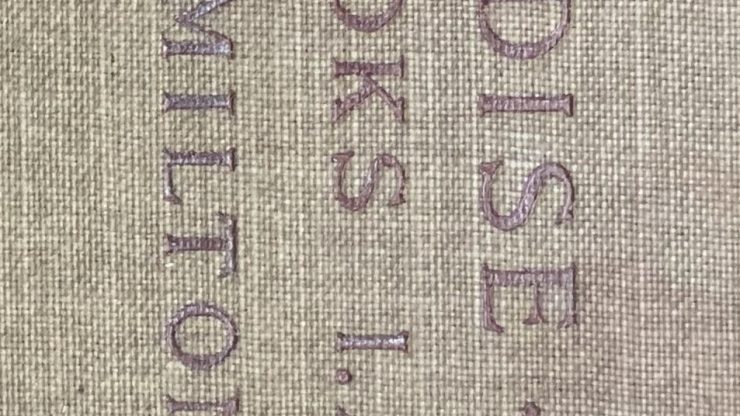The McClintock Collection by Jim Hetherington – April 2, 2019
back to the Special Collections Blog

Reverend John McClintock, who became the first president of Drew Theological Seminary in 1867, is responsible for the collection in his name that was formed in 1975. As one of his first orders of business as president, he sent an agent to Europe to buy books for the new seminary’s library. On top of what was purchased, he donated many personal books to the library.
Paradise Lost by John Milton was first published in 1674. Spanning ten books with over ten thousand lines of verse per book, Paradise Lost tells the biblical story of the fall of man in the Garden of Eden. An artistic choice, the poem does not rhyme. The publisher was confused why rhyme was not used, so Milton wrote an introduction saying that good poetry does not have to rhyme since rhyme is nothing “but the invention of a barbarous age.” The Royalists of the United Kingdom wrote in rhyming couplets, whereas Milton uses blank verse: ten-syllable metrical lines that do not rhyme. It’s symbolic of non-conformism and political freedom in the same breath seeing as he advocated for “freedom” from the “bondage” of the monarchy.
Oddly enough, Milton traveled to France and Italy, and while in Florence he paid a visit to Galileo Galilei. At the time blind and under house arrest for his challenging of authority regarding heliocentrism, Galileo was blind and confined. That visit had a profound effect on Milton’s writing, particularly his opposition to censorship. Milton later became blind. He was an anarchist who publicly advocated for the execution of King Charles I before serving in the republican government. He spoke out against the Catholic Church and did not believe in the Trinity and wrote pamphlets about the merits of divorce. Paradise Lost later became his most magnificent piece of work.
Three hundred forty-five years old, Paradise Lost delves into Satan’s character who is also known as Lucifer which means “the light bringer” in Latin. Being the first major character, his role as a semi-protagonist is quick to win the hearts of readers despite his being condemned to Hell for his rebellious habits in Heaven. This old bound book, comprising of books I and II, has a lengthy introduction and once the verse begins there are anecdotal interjections on each page. These tidbits of information refer to the author as Milton; thus they have an outsider perspective in this duo of books. Surprisingly, despite this being in a special collection, there are pencil marks annotating reading notes and explication.
Epic poems like Paradise Lost are not as prevalent in this day and age. Great modern works that transcend genre like the Harry Potter series ought to have a place in society. A carefully put together work like this book that was printed 1896 needs to be honored as the additional notes and even anecdotes compound information creating a poetic encyclopedia where the original prose is there, and so is the guide to appreciating and understanding the work. While this book is a collectible, I would love to see the rest of the books here under one roof. The real draw to the series originates in how something from the Bible could be drawn from and seem oh so real. A body of work so dated may be deserving of a sequel and a film, so when will the opportunity present itself?